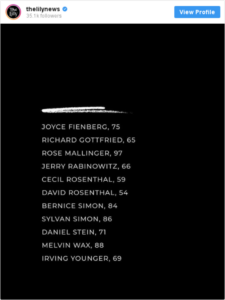More and more of us are finding ways to acknowledge the land upon which we meet, when we are beginning events. Here’s a lengthy explanation of why, with a handbook for doing so. And here’s a good set of reminders not to turn it into a “checkbox.” Here’s one other good resource on the practice, and an editorial critiquing some of the ways in which it has been done. I also found this interview useful.
Category Archives: news
Getting to know Asian women theologians
Here’s a lovely essay and long bibliography introducing a number of Asian women theologians.
Overview of race in america
The Guardian has a powerful collection of essays they’ve collected over the past year which explore race — and particularly racism — in America.
Teaching religion as anti-racism education
The American Academy of Religion has a regular newsletter which reflects on issues of teaching. This month’s issue was focused on “teaching religion as anti-racism education.”
Hatred strikes Tree of Life in Pittsburgh
Here we are again. With one person carrying hate and vitriol — and a semi-automatic weapon –into a community of faith and gunning down 11 people.
Once again, no words can adequately convey the horror, anguish, anger, and grief that arise. Turn to past posts here for dozens of resources for communities in pain. And then get out and vote in the mid-term elections next week.
As statements emerge I will post them here (please send them if you know of some).
Indigenous land acknowledgement
Here is a great initial introduction to the practice of acknowledging the land upon which we live and work, land which was colonized through genocide of native peoples.
Robin DiAngelo on white fragility
Here’s a good brief introduction to Robin DiAngelo’s discussion of white fragility :
How well intentioned white families can perpetuate racism
Here’s a useful interview with author Margaret Hagerman, who studied a series of upper middle class white families ostensibly committed to ending racism. You can tell from that adjective — “ostensibly” — that the situation is more complex than these families acknowledged.
Eddie Glaude on white privilege
Dr. Eddie Glaude, Jr. William S. Tod Professor of Religion and African American Studies at Princeton University and the author of Democracy in Black, has written a compelling essay in Time Magazine which explores the challenges of living in a country which has used race since its founding as lever for power.
Why POC needs spaces without white people
Here’s an eloquent and important essay, aimed at helping white people understand why there need to be spaces for people of color to engage each other, minus the “white gaze.”

